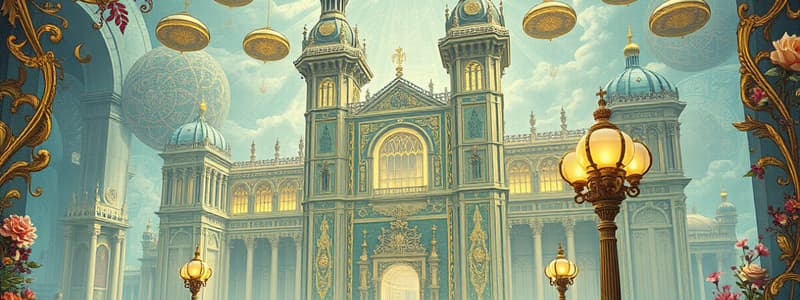Podcast
Questions and Answers
What was John Locke's belief regarding government?
What was John Locke's belief regarding government?
- The government should control every aspect of life.
- Governments should have unlimited power.
- Revolting against the government is never justified.
- People have natural rights that must be protected. (correct)
Which idea is attributed to Montesquieu?
Which idea is attributed to Montesquieu?
- Separation of government powers into branches. (correct)
- Power should be centralized in a single authority.
- Governments should focus on economic growth.
- Religious institutions should control political power.
How did Locke influence the U.S. Constitution?
How did Locke influence the U.S. Constitution?
- By suggesting an absence of government.
- By promoting the idea of social contracts.
- By introducing the concept of natural rights. (correct)
- By advocating for a monarchy.
What system did the Founding Fathers create to avoid the issues of absolutism?
What system did the Founding Fathers create to avoid the issues of absolutism?
What does Voltaire advocate for?
What does Voltaire advocate for?
What key principle stems from Montesquieu's philosophy?
What key principle stems from Montesquieu's philosophy?
What distinguishes absolutism from other forms of government?
What distinguishes absolutism from other forms of government?
Locke believed that if a government fails to protect natural rights, the people have the right to:
Locke believed that if a government fails to protect natural rights, the people have the right to:
What was one of the main ideas promoted by Thomas Hobbes regarding governance?
What was one of the main ideas promoted by Thomas Hobbes regarding governance?
How are Montesquieu's ideas reflected in the American government today?
How are Montesquieu's ideas reflected in the American government today?
What aspect of Locke's ideas directly influenced the Declaration of Independence?
What aspect of Locke's ideas directly influenced the Declaration of Independence?
What significant change occurred in the English Monarchy as a result of the Glorious Revolution?
What significant change occurred in the English Monarchy as a result of the Glorious Revolution?
The Magna Carta was significant because it:
The Magna Carta was significant because it:
Which belief is NOT associated with Enlightenment thinkers?
Which belief is NOT associated with Enlightenment thinkers?
How did the Enlightenment challenge traditional views of authority?
How did the Enlightenment challenge traditional views of authority?
Which of the following concepts is NOT associated with the principles of governance laid down by the English experience?
Which of the following concepts is NOT associated with the principles of governance laid down by the English experience?
What is a key feature of a constitutional monarchy compared to absolutism?
What is a key feature of a constitutional monarchy compared to absolutism?
What was a common outcome of the English Civil War?
What was a common outcome of the English Civil War?
Which of the following statements best describes the role of citizens in an absolutist regime?
Which of the following statements best describes the role of citizens in an absolutist regime?
What did the Enlightenment thinkers advocate as a challenge to monarchic rule?
What did the Enlightenment thinkers advocate as a challenge to monarchic rule?
Flashcards are hidden until you start studying
Study Notes
Absolutism
- Definition: A political system where monarchs possess total authority over government and citizens, often justified by the Divine Right of Kings.
- Features: Monarchs control laws, taxes, military, and religion without checks or balances, leading to limited citizen participation and heavily regulated rights.
Key Philosophers
- Thomas Hobbes argued in "Leviathan" that humans are naturally selfish. He advocated for Absolutism as a means to prevent chaos and maintain order.
The English Monarchy
- The English Monarchy consisted of royal families governing England, Scotland, Ireland, and intermittently France.
- Transitioned from an absolute monarchy to a constitutional monarchy, where power is shared with Parliament.
Historical Milestones
- Magna Carta (1215): The inaugural document restricting royal power and establishing legal principles.
- English Civil War (1642-1651): A significant conflict between the monarchy and Parliament, resulting in the temporary abolition of the monarchy.
- Glorious Revolution (1688): King James II was overthrown, leading to a constitutional monarchy where power was shared with Parliament.
Influences on American Governance
- The English monarchy experience influenced American principles, notably the concepts of limited governmental power and the importance of representative governance.
The Enlightenment
- A 17th-18th century movement emphasizing reason, individual rights, and science over tradition while advocating for personal freedoms against autocratic rule.
Key Enlightenment Thinkers
- John Locke: Promoted the idea of natural rights—life, liberty, and property—and asserted that government exists to protect these rights. If it fails, the people can revolt.
- Montesquieu: Introduced the concept of separating government powers into branches to prevent concentration of power.
- Voltaire: Championed freedom of speech, religious tolerance, and criticized absolutism.
Impact on American Government
- Locke’s philosophy directly influenced the Declaration of Independence and the U.S. Constitution, particularly regarding natural rights and government by consent.
- Montesquieu’s notion of separation of powers informed the structure of the U.S. government, comprising executive, legislative, and judicial branches.
- The Founding Fathers developed a system of checks and balances to mitigate the risks of absolutism and maintain a balance of power among branches of government.
Studying That Suits You
Use AI to generate personalized quizzes and flashcards to suit your learning preferences.




